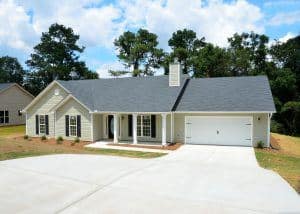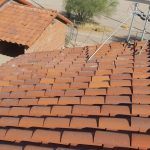
What’s the Real Cost to Replace Roof Systems in Arizona?
If you’re a homeowner or property manager in Phoenix, Tempe, Mesa, or nearby cities like Avondale, Casa Grande, or Surprise, you’ve probably wondered: what’s the real cost to replace roof systems in the Valley of the Sun?
At Castile Roofing, we’ve spent more than 14 years helping Arizona residents navigate the complex world of roofing costs, insurance claims, and seasonal wear. Whether you’re facing storm damage, structural
aging, or you just want a modern upgrade, understanding the cost to replace roof systems is critical before making any decisions.
So what drives that final number? A variety of factors—including roofing materials, square footage, pitch, underl
ayment condition, local permitting requirements, and your insurance policy—can make a major difference in pricing.
Below, we break down exactly what homeowners and businesses in Phoenix, Scottsdale, Mesa, and surrounding communities should expect when budgeting for a full replacement.
Average Cost to Replace Roof in Arizona
The average cost to replace roof systems in Arizona typically ranges from $7,000 to $25,000, depending on several variables—chiefly the square footage of your home, chosen roofing material, slope or pitch, and condition of the existing roof deck.
For a typical 1,800 sq. ft. residential home with architectural shingles in a city like Glendale or Peoria, you’re likely looking at a range of $10,000 to $13,000. If you’re replacing tile roofing in Anthem or Sun City, costs may be significantly higher due to materials and labor complexity.
According to HomeAdvisor, the national average for full roof replacement is around $11,500—but
Arizona’s unique heat exposure, monsoon storms, and intense UV radiation often demand materials and craftsmanship that exceed national standards.
The good news? At Castile Roofing, we tailor every estimate to the property and offer multiple roofing damage insurance options to help minimize your out-of-pocket costs.
But price isn’t everything. A new roof installed by experienced, ROC-licensed professionals is an investment in long-term energy savings, home equity, and peace of mind—especially in desert climates.
Cost Differences by Roofing Material

One of the biggest variables affecting the cost to replace roof systems is the material you choose.
Arizona’s unique climate—with its high UV index, extreme heat, and sudden downpours—means not all roofing materials are created equal. Here’s a breakdown of what you can expect in terms of average material costs and performance:
1. Asphalt Shingles (3-Tab or Architectural)
-
Cost: $4.00–$7.00 per sq. ft. installed
-
Lifespan: 15–25 years
-
Best For: Budget-conscious homeowners in areas like Buckeye, Goodyear, or Tolleson
Asphalt shingles are the most common and cost-effective roofing material in Arizona. They’re quick to install and relatively affordable, making them ideal for residential homes across Mesa, Glendale, and
Phoenix. If you’re looking for repair options before a full replacement, check our shingle roofing repair service.
2. Concrete or Clay Tile
-
Cost: $8.00–$15.00 per sq. ft. installed
-
Lifespan: 40–50+ years
-
Best For: Homes in higher-end areas like Scottsdale, Cave Creek, or Queen Creek
Tile roofing is popular across the Valley due to its heat resistance and long life span. However, the cost to replace roof systems with tile is significantly higher due to the weight of the materials and structural reinforcements needed. If you’re in need of residential roof repair before a full replacement, tile is a material that may allow for localized fixes—though full replacement is often more cost-effective long-term.
3. Foam Roofing
-
Cost: $6.00–$10.00 per sq. ft. installed
-
Lifespan: 20–30 years (with maintenance)
-
Best For: Flat-roofed commercial buildings or modern homes in urban centers like Tempe or Central Phoenix
Foam roofing provides excellent insulation, but it requires periodic recoating. It’s a great option for reducing energy costs and works well in combination with solar panels. For businesses, this can dramatically improve operational efficiency. Learn more about commercial applications on our commercial roofers in Phoenix page.
4. Modified Bitumen or Built-Up Roofing (BUR)
-
Cost: $5.50–$9.00 per sq. ft. installed
-
Lifespan: 15–30 years
-
Best For: Flat-roofed commercial buildings in areas like Casa Grande, Tempe, or Surprise
These layered systems are ideal for weatherproofing and durability. While primarily used on commercial

properties, some residential structures also benefit from their water resistance. Learn more about built-up roofing and its benefits for flat structures.
Cost Differences by Roofing Material
One of the biggest variables affecting the cost to replace roof systems is the material you choose. Arizona’s unique climate—with its high UV index, extreme heat, and sudden downpours—means not all roofing materials are created equal. Here’s a breakdown of what you can expect in terms of average material costs and performance:
1. Asphalt Shingles (3-Tab or Architectural)
-
Cost: $4.00–$7.00 per sq. ft. installed
-
Lifespan: 15–25 years
-
Best For: Budget-conscious homeowners in areas like Buckeye, Goodyear, or Tolleson
Asphalt shingles are the most common and cost-effective roofing material in Arizona. They’re quick to install and relatively affordable, making them ideal for residential homes across Mesa, Glendale, and Phoenix. If you’re looking for repair options before a full replacement, check our shingle roofing repair service.
2. Concrete or Clay Tile
-
Cost: $8.00–$15.00 per sq. ft. installed
-
Lifespan: 40–50+ years
-
Best For: Homes in higher-end areas like Scottsdale, Cave Creek, or Queen Creek
Tile roofing is popular across the Valley due to its heat resistance and long life span. However, the cost to replace roof systems with tile is significantly higher due to the weight of the materials and structural reinforcements needed. If you’re in need of residential roof repair before a full replacement, tile is a material that may allow for localized fixes—though full replacement is often more cost-effective long-term.
3. Foam Roofing
-
Cost: $6.00–$10.00 per sq. ft. installed
-
Lifespan: 20–30 years (with maintenance)
-
Best For: Flat-roofed commercial buildings or modern homes in urban centers like Tempe or Central Phoenix
Foam roofing provides excellent insulation, but it requires periodic recoating. It’s a great option for reducing energy costs and works well in combination with solar panels. For businesses, this can dramatically improve operational efficiency. Learn more about commercial applications on our commercial roofers in Phoenix page.
4. Modified Bitumen or Built-Up Roofing (BUR)
-
Cost: $5.50–$9.00 per sq. ft. installed
-
Lifespan: 15–30 years
-
Best For: Flat-roofed commercial buildings in areas like Casa Grande, Tempe, or Surprise
These layered systems are ideal for weatherproofing and durability. While primarily used on commercial properties, some residential structures also benefit from their water resistance. Learn more about built-up roofing and its benefits for flat structures.
Materials Breakdown: How Roofing Choices Impact the Cost to Replace Roof
The cost to replace roof materials can vary drastically depending on the type of roof you choose. While labor costs are fairly stable across the Phoenix metro area—including cities like Goodyear, Buckeye, and Mesa—the materials you select will significantly influence your total bill.
1. Asphalt Shingles (Most Affordable)
Asphalt shingles remain the most popular roofing material in Arizona due to their affordability and wide availability. A standard 3-tab shingle roof will typically run between $3.50–$5.50 per square foot installed. Architectural shingles, which last longer and provide better aesthetic appeal, can push costs toward $6.00–$8.00 per square foot.
Here’s a breakdown by the National Association of Realtors showing average U.S. costs by material.
If you’re comparing costs, check out our dedicated guide to shingle roofing repair to understand what repairs versus full replacements might cost.
2. Tile Roofing (More Durable, Higher Initial Cost)
Tile roofing is common in neighborhoods like Scottsdale and Queen Creek due to its longevity and desert appeal. Clay and concrete tiles can range from $8.00 to $15.00 per square foot installed. The higher cost to replace roof in this category reflects both materials and the expertise required for installation.
3. Flat Roofs and Commercial Systems
Flat roofing systems—including built-up roofing and single-ply membranes—are more prevalent in commercial settings across Phoenix, Tempe, and Surprise. Depending on the system, expect to pay:
-
Built-Up Roofing (BUR): $5.00–$8.00 per square foot
-
Modified Bitumen: $4.50–$7.50 per square foot
-
Single-Ply Membranes (TPO/PVC): $6.00–$10.00 per square foot
You can explore our page on commercial roofers in Phoenix to learn more about materials suited for business and industrial buildings.
4. Metal Roofing (Rising in Popularity)
While not as common in urban neighborhoods, metal roofing is gaining ground in areas like Cave Creek and New River where fire resistance and long lifespan matter. Depending on the gauge and coating, prices range from $8.00 to $16.00 per square foot. For some comparisons, Roof Hippie offers a detailed price-per-square-foot breakdown.
Labor, Permits, and Disposal — What Else Adds to the Cost to Replace Roof
While roofing materials grab most of the spotlight, there are additional expenses every property owner must consider when evaluating the full cost to replace roof. From skilled labor to municipal permitting and debris disposal, these often-overlooked costs can add up quickly—especially in high-growth Arizona cities like Peoria, Anthem, and Casa Grande.
Skilled Labor Costs in Arizona
Labor is one of the largest non-material contributors to the overall cost to replace roof. In Phoenix, the average labor rate for roofers hovers between $50–$80 per hour depending on the complexity of the job and crew size. Jobs that involve steep slopes, multistory structures, or intricate tilework can require additional labor hours or specialized tools, which increase the total cost.
That said, working with a reputable and ROC-licensed team like Castile Roofing ensures you’re getting fair value, not inflated costs.
Permit Fees and Inspections
Every Arizona city—from Avondale to Tolleson—requires permits for full roof replacements. These costs are typically based on the size and scope of the work. For example:
-
In Phoenix, residential re-roof permits range from $250 to $400
-
In Glendale and Tempe, commercial roof replacement permits may cost more and require detailed engineering specs
For more on local permit requirements, consult Phoenix Planning & Development Department.
At Castile Roofing, we help streamline the permit process, ensuring you remain compliant while keeping your project on track.
Tear-Off and Disposal
If your project involves tearing off an existing roof, you’ll need to budget for removal and hauling. Disposal costs often range from $1.00 to $3.00 per square foot depending on:
-
Type of old roofing (shingles, tile, BUR)
-
Accessibility of the property
-
Dumpster rental and landfill fees in your city
In places like Buckeye and Surprise, where landfills are further out, disposal can add a few hundred dollars to your project total.
Our crew is trained in efficient tear-offs and safe waste disposal, reducing unnecessary costs and delays. Learn more about how we handle residential roof repair and restoration projects.
Timing Matters: Seasonal Factors That Impact the Cost to Replace Roof
Arizona’s climate isn’t just hot—it’s strategic. When it comes to the cost to replace roof, the time of year you choose can have a significant effect on both availability and pricing.
Peak Season vs. Off-Season: When Costs Fluctuate
Roofing contractors in Phoenix, Tempe, and Goodyear tend to stay busiest during spring and early fall. These months offer optimal working conditions before the peak of summer or onset of winter rains. Because of increased demand during these windows, labor rates and scheduling delays can bump up your final cost to replace roof.
If you’re flexible, consider scheduling your project during the Arizona winter (January–February) or the height of summer (July–August). While extreme weather may pose challenges, experienced teams like Castile Roofing have the manpower and tools to work year-round.
Monsoon Season Risk
Monsoon season (typically mid-June to September) introduces a wildcard into roofing timelines. While emergency repair jobs often surge after storm damage, replacement work is harder to schedule due to unpredictable rain patterns. This uncertainty can affect crew availability and material delivery times, indirectly raising the cost to replace roof.
Stay updated with NOAA’s Arizona Monsoon Outlook to plan wisely.



